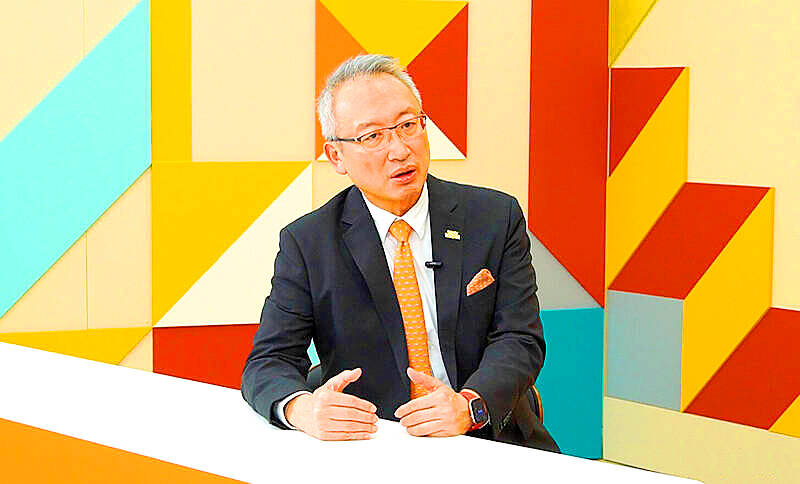US president-elect Donald Trump’s “America first” policy could deter Beijing from taking Taiwan by force, as the interests of the US and Taiwan are aligned, Deputy Minister of Foreign Affairs Francois Wu (吳志中) said in an interview published yesterday.
US-China relations and their influence on Taiwan came into focus after Trump won the US election on Tuesday, setting him up for a return to the White House in January.
In an interview with the Chinese-language Liberty Times (sister paper of the Taipei Times) conducted on Tuesday, Wu said that a “new cold war” would ensue as a result of US-China trade competition.

Photo: Chen Yi-ling, Taipei Times
Troubled by flagging manufacturing and domestic economic issues, the US has turned conservative or even hesitant about joining the Comprehensive and Progressive Agreement for Trans-Pacific Partnership, he said.
Under such circumstances, it has become increasingly intolerant of China’s move to resolve domestic overproduction by aggressively exporting to the US and Europe, leading to a “new cold war” in which Taiwan would have to “choose a side,” Wu said.
Faced with these challenges, Taiwan should maintain its stance of upholding democracy and freedom, as well as cherish freedoms of expression and movement, he said.
Western countries have in recent years become increasingly “pragmatic,” focusing on defending their own national interests, such as Trump’s “America first” policy, he said.
From Washington’s perspective, averting cross-strait conflict is in the US’ interest, as well as in the interest of Taiwan, Japan and Europe, he said, adding that most countries “would not allow China to take Taiwan by force.”
Wu added that he was not worried that other countries would lose interest in cross-strait issues as they prioritize their own interests.
Defending their own interests means they would not allow national interests to be affected, even by things happening on the other side of the world, he said.
Most countries would take defensive measures against Chinese hegemony, Wu said, adding that it “might not be a bad thing” for Taiwan.
Cross-strait stability is intertwined with global trade flow: If global trade is not able to operate smoothly, countries would not be able to maintain their interests, he said.
Countries prioritizing self-interests still need a stable world order, which is a valuable common interest among most countries, including Taiwan, Wu said.
The biggest change Taiwan has made over the past eight years is conveying the message to the world that their interests are in line with Taiwan’s interests, such as democratic values and freedom of navigation in the Taiwan Strait, he said.
China has been acting against the interests of most countries with its frequent military drills around Taiwan, and most countries have finally realized that the world’s interests align with those of Taiwan, Wu said.

An essay competition jointly organized by a local writing society and a publisher affiliated with the Chinese Communist Party (CCP) might have contravened the Act Governing Relations Between the People of the Taiwan Area and the Mainland Area (臺灣地區與大陸地區人民關係條例), the Mainland Affairs Council (MAC) said on Thursday. “In this case, the partner organization is clearly an agency under the CCP’s Fujian Provincial Committee,” MAC Deputy Minister and spokesperson Liang Wen-chieh (梁文傑) said at a news briefing in Taipei. “It also involves bringing Taiwanese students to China with all-expenses-paid arrangements to attend award ceremonies and camps,” Liang said. Those two “characteristics” are typically sufficient

A magnitude 5.9 earthquake that struck about 33km off the coast of Hualien City was the "main shock" in a series of quakes in the area, with aftershocks expected over the next three days, the Central Weather Administration (CWA) said yesterday. Prior to the magnitude 5.9 quake shaking most of Taiwan at 6:53pm yesterday, six other earthquakes stronger than a magnitude of 4, starting with a magnitude 5.5 quake at 6:09pm, occurred in the area. CWA Seismological Center Director Wu Chien-fu (吳健富) confirmed that the quakes were all part of the same series and that the magnitude 5.5 temblor was

The brilliant blue waters, thick foliage and bucolic atmosphere on this seemingly idyllic archipelago deep in the Pacific Ocean belie the key role it now plays in a titanic geopolitical struggle. Palau is again on the front line as China, and the US and its allies prepare their forces in an intensifying contest for control over the Asia-Pacific region. The democratic nation of just 17,000 people hosts US-controlled airstrips and soon-to-be-completed radar installations that the US military describes as “critical” to monitoring vast swathes of water and airspace. It is also a key piece of the second island chain, a string of

The Central Weather Administration has issued a heat alert for southeastern Taiwan, warning of temperatures as high as 36°C today, while alerting some coastal areas of strong winds later in the day. Kaohsiung’s Neimen District (內門) and Pingtung County’s Neipu Township (內埔) are under an orange heat alert, which warns of temperatures as high as 36°C for three consecutive days, the CWA said, citing southwest winds. The heat would also extend to Tainan’s Nansi (楠西) and Yujing (玉井) districts, as well as Pingtung’s Gaoshu (高樹), Yanpu (鹽埔) and Majia (瑪家) townships, it said, forecasting highs of up to 36°C in those areas